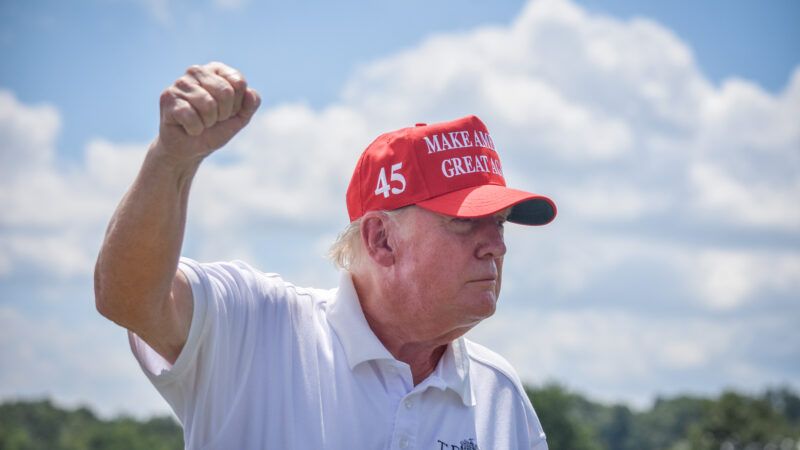Trump Floats Tariff Plan That Will Make Everything More Expensive
The "Tariff Man" promises to strike again.

Inflation apparently has not been high enough in the few years since former President Donald Trump left office—so he's proposing new import taxes that will raise prices for American families and businesses.
In an interview last week with Larry Kudlow, the former president floated plans for a new 10 percent tariff on all imports to the United States. Trump described the proposal as putting "a ring around the collar" of the U.S. economy.
"When companies come in and they dump their products in the United States, they should pay, automatically, let's say a 10 percent tax," Trump said on Fox Business. "I do like the 10 percent for everybody."
On Tuesday, The Washington Post reported that the same topic was discussed Monday night at a Trump campaign strategy meeting in Bedminster, New Jersey. According to the Post, the plan being discussed would include a "'universal baseline tariff' on virtually all imports to the United States" and figures to be a major plank in Trump's 2024 presidential campaign.
For starters, kudos to Trump for correctly describing his plan as a tax. Because that's exactly what this would be: a tax hike on American businesses and consumers who purchase products from abroad. Currently, the average U.S. tariff is about 3 percent—though they vary widely depending on what item is being imported and from where.
That's the only detail worth praising, however.
As Trump should have learned after hiking tariffs on steel, aluminum, and loads of goods imported from China during his term in office, import taxes do little more than hike costs for American consumers and businesses. A recent report by the International Trade Commission concluded that Americans "bore nearly the full cost of these tariffs because import prices increased at the same rate as the tariffs." Economists Mary Amiti, Stephen J. Redding, and David Weinstein have calculated that the tariffs directly reduced Americans' income by a cumulative $1.4 billion per month.
Those costs are still adding up, since the Biden administration has largely left Trump's tariffs in place—despite Biden's (accurate) assessment on the campaign trail in 2019 that "any beginning econ student at Iowa or Iowa State could tell you the American people are paying his tariffs." Meanwhile, Congress has not done anything to limit or rescind executive power over trade policy in the wake of Trump's abuse of those powers.
Among people who actually understand economics, Trump's newest proposal has been roundly criticized.
"Protective tariffs are punitive taxes on people's expenditures of their incomes," Don Boudreaux, a senior fellow at the Mercatus Center, a free market think tank housed at George Mason University, tells Reason. "It's an utter mystery why Trump believes that ordinary Americans, whose interests he claims to represent, would be enriched by the government imposing even heavier taxes on their spending choices."
Adam Posen, president of the Peterson Institute for International Economics (PIIE), a trade-focused think tank, told the Post that Trump's proposal was "lunacy" and "horrifying."
Rep. Don Beyer (D–Va.), who has cosponsored a bipartisan bill to require presidents to gain approval from Congress before implementing tariffs for the purposes of national security, called Trump's proposal "idiotic, illegal, and…a disaster for our economy" in a statement released Tuesday.
Beyer said any attempt at implementing universal 10 percent tariffs would "immediately violate numerous trade agreements, including the United States–Mexico–Canada Agreement which Trump himself signed."
Even from a purely political point of view—that is, without the obvious economic and legal ramifications—this seems utterly absurd.
Trump is a Republican running for office against an incumbent Democrat whose policies have contributed to rising inflation—and yet his tariff plan amounts to a promise to raise taxes, and prices, on Americans. Any other Republican would be laughed off the campaign trail for promising to raise taxes by 10 percent.
Trump remains the clear frontrunner to win the Republican nomination.


Show Comments (96)